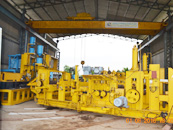 essespipes@gmail.com
essespipes@gmail.com  +91 9445092679, +91 44 2615 4301
+91 9445092679, +91 44 2615 4301
Process
1. MS Pipes
Mild Steel Pipes as per IS 3589.
MS pipes are produced by mainly two methods namely LSAW and HSAW methods.
LSAW. Longitudinal Submerged Arc Welded Pipes.
 Hot Rolled (HR) Plates or coil forms the raw material. Coils are converted to plates by de coiling to the required slit length in the case of HRCoils. The plates either from Coil or direct from plate plant are trimmed and rolled to the specified diameter. The Shells so formed will be jointed to form Pipes by Automatic Submerged Arc Welding (SAW) technique. The weld joints will be in Longitudinal and Circumferential direction and thus LSAW. The pipe material and the welding are subjected to quality tests as per standards including hydrostatic testing. Various protective coating and lining are applied to protect the pipes from Corrosion including Cathodic Protection after installation in the case of underground systems.
Hot Rolled (HR) Plates or coil forms the raw material. Coils are converted to plates by de coiling to the required slit length in the case of HRCoils. The plates either from Coil or direct from plate plant are trimmed and rolled to the specified diameter. The Shells so formed will be jointed to form Pipes by Automatic Submerged Arc Welding (SAW) technique. The weld joints will be in Longitudinal and Circumferential direction and thus LSAW. The pipe material and the welding are subjected to quality tests as per standards including hydrostatic testing. Various protective coating and lining are applied to protect the pipes from Corrosion including Cathodic Protection after installation in the case of underground systems.
Portability of the plant is considered an advantage in reducing logistical expenditure.
HSAW Helically Submerged Arc Welded (HSAW) pipes.
 HSAW pipes, also called spirally welded pipes also confirms to IS 3589. Hot Rolled (HR ) Coils of specified width and thickness forms the raw material. The Coil is de coiled to make it flat and subsequently and simultaneously formed in a helical formation in a forming jig which forms an integral part of the mill. Welding of the so formed helical joint will be done by Submerged Arc Welding technique. The pipe material and the welding are subjected to quality tests as per standards including hydrostatic testing. Various protective coating and lining are applied to protect the pipes from Corrosion including Cathodic Protection after installation in the case of underground systems.
HSAW pipes, also called spirally welded pipes also confirms to IS 3589. Hot Rolled (HR ) Coils of specified width and thickness forms the raw material. The Coil is de coiled to make it flat and subsequently and simultaneously formed in a helical formation in a forming jig which forms an integral part of the mill. Welding of the so formed helical joint will be done by Submerged Arc Welding technique. The pipe material and the welding are subjected to quality tests as per standards including hydrostatic testing. Various protective coating and lining are applied to protect the pipes from Corrosion including Cathodic Protection after installation in the case of underground systems.
of the plant is considered a disadvantage as the mill is not so portable and so difficult to reduce logistical expenditure. However Transportation by nesting pipes inside bigger ones compensate to a reasonable level in the case of requirements of different sizes of pipes at the same time.
Manufacturing facility. Esses pipes have manufacturing facility in Chennai Warangal and Saklespuram.
2. RCC Pipes. (Reinforced Concrete pipes.)
Rcc pipes are also called Hume pipes which are extensively used in India for water, Sewerage, Drainage and irrigation apart from culverts road crossing and as casing for underground utilities. These pipes have an estimated life of more than 100 years when installed underground. For the same reason these are considered fit and forget solution on many applications
standards. Indian standard IS 458, 2003 gives details of various size pipes of different pressure ratings. Non pressure pipes form a major quantum of this product in general application.
Manufacturing process.
Two types of manufacturing processes, Spinning and Vertical Casting are standardized and proven by experience. Bureau of Indian Standards ( BIS) standard IS 458 standardizes the quality and dimensional uniformity.
Spinning process.
The concrete pipe is moulded by rotating concrete in the mould for compaction
The same is de molded after sufficient curing. The pipes are further cured for the required number of days as per specification.
Vertical casting process.
In this process the concrete is compacted with mechanical vibration.
The same is de molded after sufficient curing. The pipes are further cured for the required number of days as per specification.
Manufacturing Facility. Esses Engineers have manufacturing facility at Munger. We have plans to multiply capacity by adding one more unit in Tamilnadu.
Quality Control
We have an approved quality assurance plan which is in line with the requirements of the BIS and documented as per the formats prescribed by the Bureau.

